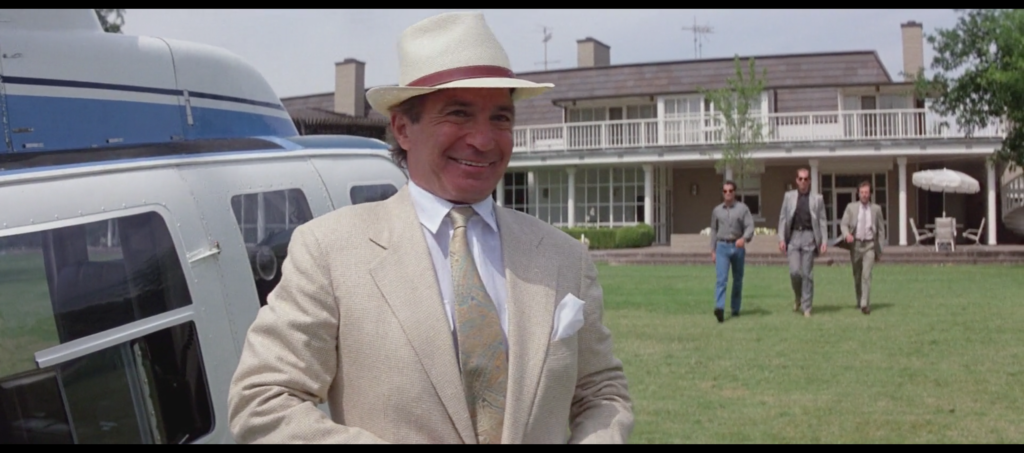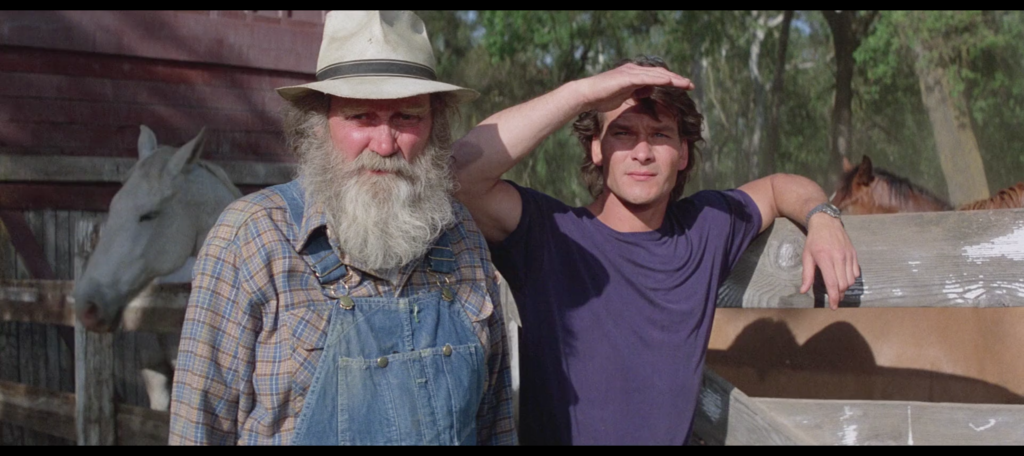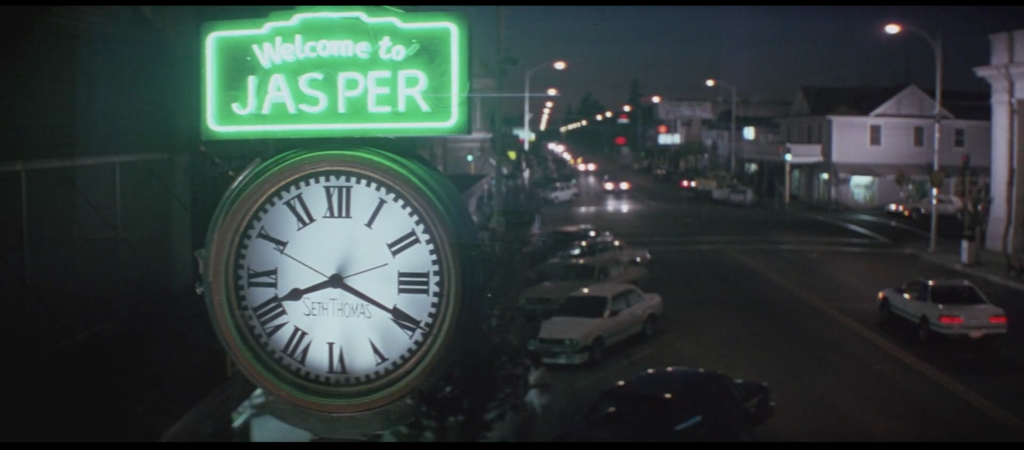Posts Tagged ‘jasper’
022. An elevator in an outhouse
January 22, 2019“Callin’ me ‘sir’ is like puttin’ an elevator in an outhouse: It don’t belong.” So says Emmet, Dalton’s prospective landlord, to Dalton, Emmet’s prospective tenant, soon after they meet. Dalton is unflaggingly respectful to those his cooler-sense tell him deserve respect. Emmet, with his overalls and scraggly beard and extremely menacing hay-hooks, is such a fellow, hence Dalton’s use of that three-letter term of deference. Emmet in turn is determined not to put on airs, even at the expense of seeming less of an authority figure in the eyes of someone in whom he must trust to behave himself on their shared property on whom he will soon depend for income. In a minute or two he will rent Dalton a massive, fully furnished loft apartment for $100 a month, which is one-fifth of what Dalton makes every day, so he’s clearly willing to forego other markers of landlordism too. But in the meantime, an analogy that has never before passed the lips of man will have to do. I’d say it’s a singularly odd and vulgar expression to coin, but we’ve got “balls big enough to come in a dumptruck” and “does a hobbyhorse have a wooden dick” and “I used to fuck guys like you in prison” to contend with in this film alone, so “singularly” is out. Still, this is our first taste of Road House‘s penchant for turning a phrase until it gets dizzy and collapses, and thus it’s a memorable one.
But it wasn’t until yesterday, writing about the sign that welcomes weary travelers to Jasper, that I got to thinking about how well the expression sums up the existence of Emmet and Dalton’s soon to be shared enemy, Brad Wesley. Like an elevator in an outhouse, Wesley represents the intrusion of commodification (as opposed to commode-ification) and technological overreach in the Jasper ecosystem. His house is the biggest house. His businesses are the biggest business. His goons are the biggest goons. His truck has the biggest wheels. Were he to construct an outhouse, an elevator is not out of the question.
What’s more, so many of his scenes are literal intrusions into places he does not belong: the opposite lane of traffic, the post-cleanup Double Deuce, the auto parts dealership run by the uncle of his ex-wife, Pete Strodenmire’s Ford showroom, and—most importantly, since the “elevator in an outhouse” exchange is bookended by it—the airspace above Emmet’s ranch. As Emmet and Dalton meet and negotiate, Brad buzzes them with a helicopter that, like his in-ground pool and his monster truck and (one presumes) his JC Penney, feels about as out of place in this environment as…well, you know.
Brad Wesley livin’ in Jasper is like puttin’ an elevator in an outhouse: He don’t belong. If you’ll permit me to take the analogy one step further: No matter how far up he may go, he’s still just a pile of shit.
021. Welcome to Jasper
January 21, 2019
It would be incorrect to say that the “Welcome to Jasper” sign situated atop a clock in the town’s main thoroughfare is the sight that greets Dalton when he first drives into town, because he’s driving into view from the opposite direction. This leaves us with two possible interpretations. Either he’s driven clear across town from one end to the next just to take the place in and we’re catching up with him as he hits the opposite border from where he started, or this sign is an ad hoc affair in a shot the logic of which was not exactly thought through by the film’s director. Considering the strange effect cars seem to have on the amount of sense the movie makes at any given time I lean towards the latter interpretation.
Be that as it may, I hope Dalton caught it in his rearview mirror as he passed by, because it tells him a lot about the town, and the main body of the movie, he’s about to enter. The bright green neon signage is an unusual choice, either for a border marker or for a greeting from the town’s main shopping district. It evokes the neon of the Bandstand sign more than the wooden billboard paid for by the local Rotarians. That, at least, I believe was intentional on the part of the filmmakers. You are entering a Road House town.
The neon itself rests atop a tony-looking Seth Thomas clock. The same manufacturer created the clocks that greet travelers in Grand Central Station. It’s emblematic of both a bygone time and the promise the future held during that time, a past-future when it was possible to go anywhere and be anyone. The neon, too, has its own retro connotations, more sock-hop than Beaux-Arts. They don’t match up.
The combination makes sense only in the context of the film-Jasper’s crazy-quilt approach to authenticity. This is a town of bearded old codgers who raise horses, and also have expensive faux-rustic loft apartments in their barns, located directly across the water from mansions with property big enough for helicopters to land on. It’s the home of countrified fellas named Red who run small auto-parts stores and huge Ford card dealerships, both of which are held up to be models of small-business entrepreneurship against Brad Wesley’s chain-store depredations. It’s a place where one dive bar out of several that we visit can be the stomping ground of a clientele straight out of The Road Warrior one month and a mecca for nightclubbers who pay top dollar to see a blind white boy play the blues the next, predicated on the garish design sensibilities of the bar’s rich owner and the ability of the bar’s cooler to settle all problems in the town with violent force.
And you know that “main thoroughfare” bit? Who knows! I basically made that up, since we never see this place nor anywhere remotely like it ever again. This crowded stretch of commercial development with decent walkability and the network of dirt roads, junkyards, and greasy-spoon diners the rest of the movie traverses have about as much in common as, well, the clock and the neon sign. But each stretch of road broadcasts realness.
Dalton intuits this, which you can see in the way he self-effaces regarding his fancy degree from New York University, but takes the ancient practice of tai chi directly to the shores of Jasper’s lake-river. By turning the sign away from Dalton’s point of view at this early moment, Dalton’s status in the town is left an open question—one quickly answered, true, but that answer is earned. Dalton is welcome in Jasper.
Brad Wesley talks a good game about small-town values and that old time rock and roll, but everything else about him—riding in a chopper, erecting malls, interacting with nature primarily by killing, stuffing, and mounting wild animals from around the world rather than the good ol’ USA—does not. This makes him an interloper, an occupier, a colonizer, someone as out of place in Jasper as a Calvin Klein’s Obsession ad would be below that neon sign and Seth Thomas clockface. Brad Wesley is not welcome in Jasper.
But you are welcome in Jasper, dear viewer. You are welcome here from the start, trusted by the town to take it into your heart in all its complementary contradictions. You must be, because it’s the only way to move forward and drive on to what awaits.



